Food safety
Food_safety___食品安全___英文版__PPT
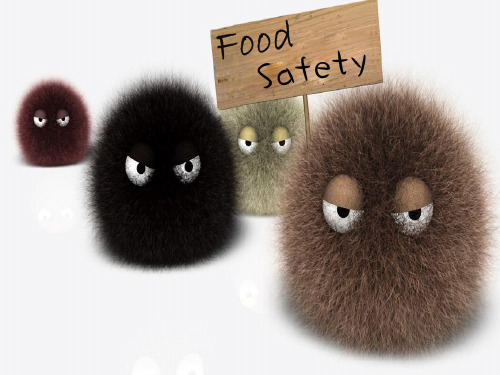
Swill-cooked dirty oil (地沟油)
It's from sewer(下水道) being extracted from the catering industry waste, and sometimes called hogwash oil because it is inedible and unsanitary .
What is food safety ?
Food safety that poisonous and harmful substances
in food will affect public health.
Here are some harmful food additives(添加剂)
• It was firstly found in Sanlu milk • By November on 27 in 2008 there were 294,000 babies suffering from urinary tract stones and 11 died of drinking the milk which were added too much melamine.
Melamine (三聚氰胺)
• Melamine is a chemical used in making plastics and fertilizer. • Many milk manufacturers add too much melamine to increase milk protein content .
The third point is that customers can not distinguish the quilities of food. And the forth point is that the supervision of food by government was not in adequate .
食品安全 英文

食品安全英文Food Safety。
Food safety is a critical issue that affects everyone, regardless of age, gender, or background. Ensuring the safety of the food we consume is essential for maintaining good health and preventing the spread of foodborne illnesses. In this document, we will explore the importance of food safety, the potential risks associated with unsafe food practices, and the measures that can be taken to promote food safety in our daily lives.First and foremost, it is important to understand the significance of food safety. Foodborne illnesses can have serious consequences, ranging from mild discomfort to severe illness and even death. Contaminated food can harbor harmful bacteria, viruses, parasites, and chemical substances that can pose a threat to human health. Therefore, it is crucial to prioritize food safety in all stages of food production, processing, distribution, and consumption.There are various potential risks associated with unsafe food practices. Improper handling, storage, and cooking of food can lead to contamination and the growth of harmful microorganisms. Cross-contamination, where bacteria from raw food are transferred to cooked food, can also occur if proper hygiene practices are not followed. Additionally, consuming expired or spoiled food can result in food poisoning and other health issues. It is important to be aware of these risks and take proactive measures to mitigate them.To promote food safety, it is essential to follow good hygiene practices in the kitchen and when handling food. This includes washing hands thoroughly before and after handling food, using separate cutting boards for raw and cooked foods, and ensuring that food is cooked to the appropriate temperature to kill harmful bacteria. Proper storage of food is also crucial, as perishable items should be refrigerated promptly and leftovers should be consumed within a safe timeframe.In addition to personal hygiene and food handling practices, it is important for food producers and suppliers to adhere to food safety regulations and standards. This includes maintaining clean and sanitary facilities, implementing quality control measures, and conducting regular inspections to ensure that food products meet safety requirements. Consumers also play a role in promoting food safety by being informed and vigilant about the food they purchase and consume.Furthermore, education and awareness are key components of promoting food safety. By understanding the potential risks and best practices for food safety, individuals can make informed decisions about the food they eat and take proactive steps to protect themselves and their families. This can include reading food labels, being mindful of expiration dates, and seeking out reputable sources of information about food safety.In conclusion, food safety is a fundamental aspect of public health and well-being. By understanding the importance of food safety, recognizing potential risks, and taking proactive measures to promote food safety in our daily lives, we can contribute to a safer and healthier food environment for everyone. It is essential for individuals, food producers, and regulatory authorities to work together to prioritize food safety and minimize the risks associated with unsafe food practices. By doing so, we can all enjoy the benefits of safe and nutritious food.。
Food-safety(食品安全)英文版只是课件

Why are there so many food safety accidents in our life?
I think the reasons include the following points
The first point is drive of profit .
The second point is that the professional and manager lack professional knowledge and safety-crisis consciousness in food corporation.
Swill-cooked dirty oil (地沟油)
It's from sewer(下水道) being extraБайду номын сангаасted from the catering industry waste, and sometimes called hogwash oil because it is inedible and unsanitary .
Health hazards
These subtances do a lot of harm to our health.such as indigestion ,diarrhea (腹 泻),and many different types of cancer
“Shou Rou Jing” poisoning accident in GuangZhou and ShangHai(2006)
Melamine (三聚氰胺)
• Melamine is a chemical used in making plastics and fertilizer.
food safety
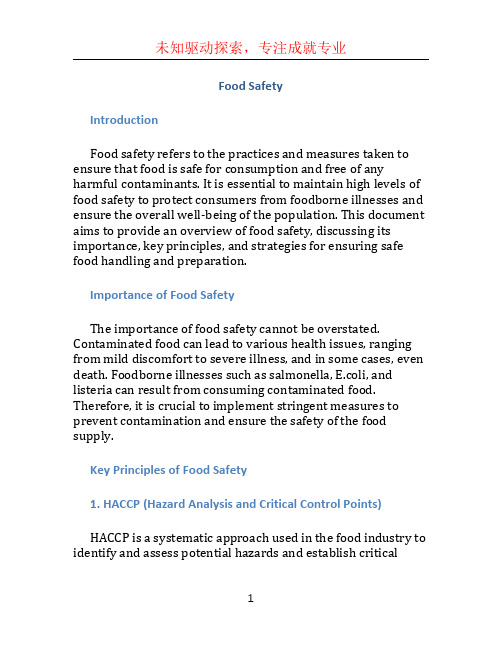
Food SafetyIntroductionFood safety refers to the practices and measures taken to ensure that food is safe for consumption and free of any harmful contaminants. It is essential to maintain high levels of food safety to protect consumers from foodborne illnesses and ensure the overall well-being of the population. This document aims to provide an overview of food safety, discussing its importance, key principles, and strategies for ensuring safe food handling and preparation.Importance of Food SafetyThe importance of food safety cannot be overstated. Contaminated food can lead to various health issues, ranging from mild discomfort to severe illness, and in some cases, even death. Foodborne illnesses such as salmonella, E.coli, and listeria can result from consuming contaminated food. Therefore, it is crucial to implement stringent measures to prevent contamination and ensure the safety of the food supply.Key Principles of Food Safety1. HACCP (Hazard Analysis and Critical Control Points)HACCP is a systematic approach used in the food industry to identify and assess potential hazards and establish criticalcontrol points to prevent, eliminate, or reduce these hazards to an acceptable level. The seven principles of HACCP include:•Conducting a hazard analysis.•Identifying critical control points (CCPs).•Establishing critical limits for each CCP.•Monitoring CCPs.•Establishing corrective actions.•Verifying that the system is working effectively.•Documenting all procedures and records.2. Personal HygieneMaintaining good personal hygiene is essential for food handlers to prevent the spread of harmful bacteria and other contaminants. Key aspects of personal hygiene include:•Regular handwashing using soap and warm water.•Wearing clean and appropriate protective clothing, such as hairnets, gloves, and aprons.•Avoiding working while sick or suffering from infections.•Avoiding touching face, hair, or other body parts while handling food.3. Cross-contamination PreventionCross-contamination occurs when harmful bacteria or other microorganisms are transferred from one food item to another, usually through contact with contaminated surfaces, utensils, or food handlers. To prevent cross-contamination:•Keep raw and cooked foods separate.•Use different cutting boards and utensils for raw and cooked foods.•Clean and sanitize surfaces, utensils, and equipment regularly.•Practice proper storage, ensuring that raw meats are stored separately and adequately wrapped to avoid anyleakage.4. Safe Food Handling PracticesProper food handling practices are crucial in preventing foodborne illnesses. Here are a few essential practices:•Thoroughly cook food at appropriate temperatures to kill bacteria.•Store food at safe temperatures (below 40°F/4°C for refrigeration, above 140°F/60°C for hot holding).•Use safe water and ingredients for food preparation.•Ensure proper thawing of frozen foods.•Minimize the time food spends in the temperature danger zone (40°F/4°C to 140°F/60°C).Strategies for Ensuring Food Safety1. Implementation of Food Safety Management SystemsFood establishments should adopt comprehensive food safety management systems, such as ISO 22000 or the Global Food Safety Initiative (GFSI) recognized standards. These systems provide a framework for effectively managing food safety by addressing potential hazards and implementing appropriate controls.2. Regular Inspections and AuditsRegulatory authorities should conduct regular inspections and audits of food establishments to ensure compliance with food safety regulations. These inspections help identify any potential issues and provide guidance for improvement.3. Employee Training and EducationProperly trained and educated staff is essential for maintaining food safety standards. Food handlers should receive regular training on proper food handling, personal hygiene, and cleaning and sanitization practices. Ongoingeducation programs can help ensure that employees stay up-to-date with the latest food safety guidelines.4. Public Awareness and EducationCreating public awareness about food safety is crucial for consumers to make informed choices. Educational campaigns can help people understand the importance of proper food handling, storage, and preparation. Additionally, providing information about common foodborne illnesses and their symptoms can empower individuals to take necessary precautions.ConclusionFood safety is a critical aspect of public health and well-being. By implementing the key principles of food safety and adopting appropriate strategies, we can prevent foodborne illnesses and ensure the safety of our food supply. It is the collective responsibility of food establishments, regulatory authorities, and consumers to prioritize food safety and work together to promote a healthy and safe food environment.。
英语作文 food safety
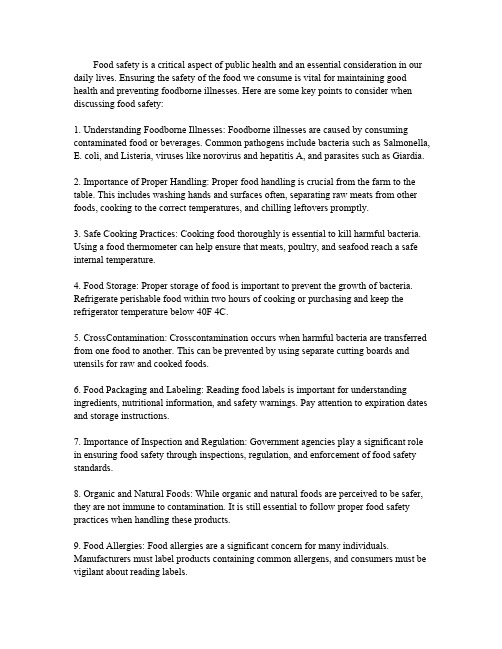
Food safety is a critical aspect of public health and an essential consideration in our daily lives.Ensuring the safety of the food we consume is vital for maintaining good health and preventing foodborne illnesses.Here are some key points to consider when discussing food safety:1.Understanding Foodborne Illnesses:Foodborne illnesses are caused by consuming contaminated food or mon pathogens include bacteria such as Salmonella, E.coli,and Listeria,viruses like norovirus and hepatitis A,and parasites such as Giardia.2.Importance of Proper Handling:Proper food handling is crucial from the farm to the table.This includes washing hands and surfaces often,separating raw meats from other foods,cooking to the correct temperatures,and chilling leftovers promptly.3.Safe Cooking Practices:Cooking food thoroughly is essential to kill harmful bacteria. Using a food thermometer can help ensure that meats,poultry,and seafood reach a safe internal temperature.4.Food Storage:Proper storage of food is important to prevent the growth of bacteria. Refrigerate perishable food within two hours of cooking or purchasing and keep the refrigerator temperature below40F4C.5.CrossContamination:Crosscontamination occurs when harmful bacteria are transferred from one food to another.This can be prevented by using separate cutting boards and utensils for raw and cooked foods.6.Food Packaging and Labeling:Reading food labels is important for understanding ingredients,nutritional information,and safety warnings.Pay attention to expiration dates and storage instructions.7.Importance of Inspection and Regulation:Government agencies play a significant role in ensuring food safety through inspections,regulation,and enforcement of food safety standards.anic and Natural Foods:While organic and natural foods are perceived to be safer, they are not immune to contamination.It is still essential to follow proper food safety practices when handling these products.9.Food Allergies:Food allergies are a significant concern for many individuals. Manufacturers must label products containing common allergens,and consumers must be vigilant about reading labels.10.Global Food Safety:With the globalization of food supply chains,food safety has become a global issue.International cooperation and standards are necessary to ensure the safety of imported and exported food products.11.Consumer Education:Educating consumers about food safety is essential.Public health campaigns and educational programs can help raise awareness and promote safe food handling practices.12.Technological Innovations:Advances in technology,such as blockchain for traceability and smart packaging that monitors freshness,can enhance food safety and traceability.13.Sustainability and Food Safety:Sustainable food production methods can contribute to food safety by reducing the need for chemical inputs and promoting healthier ecosystems.14.Emerging Food Safety Issues:As new food products and technologies emerge,so do new food safety challenges.It is important to stay informed about these developments and adapt safety practices accordingly.15.Personal Responsibility:Ultimately,each individual has a responsibility to practice safe food handling and preparation to protect themselves and their families from foodborne illnesses.By understanding and implementing these food safety practices,we can enjoy a safer and healthier diet,reducing the risk of foodborne illnesses and promoting overall wellbeing.。
《食品安全》教学大纲
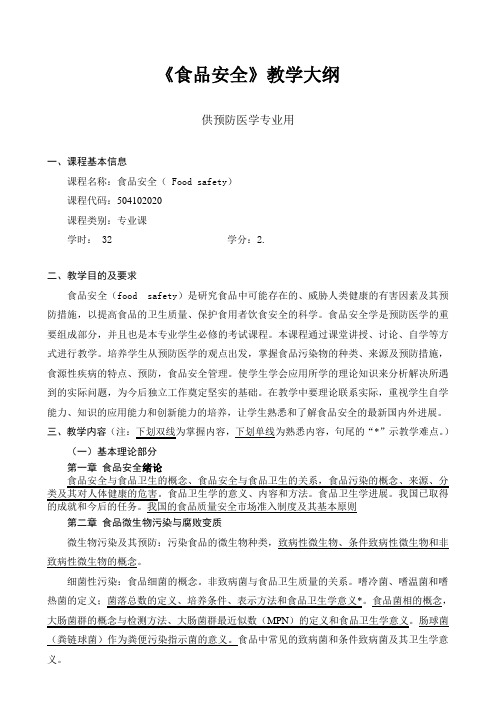
《食品安全》教学大纲供预防医学专业用一、课程基本信息课程名称:食品安全( Food safety)课程代码:504102020课程类别:专业课学时: 32 学分:2.二、教学目的及要求食品安全(food safety)是研究食品中可能存在的、威胁人类健康的有害因素及其预防措施,以提高食品的卫生质量、保护食用者饮食安全的科学。
食品安全学是预防医学的重要组成部分,并且也是本专业学生必修的考试课程。
本课程通过课堂讲授、讨论、自学等方式进行教学。
培养学生从预防医学的观点出发,掌握食品污染物的种类、来源及预防措施,食源性疾病的特点、预防,食品安全管理。
使学生学会应用所学的理论知识来分析解决所遇到的实际问题,为今后独立工作奠定坚实的基础。
在教学中要理论联系实际,重视学生自学能力、知识的应用能力和创新能力的培养,让学生熟悉和了解食品安全的最新国内外进展。
三、教学内容(注:下划双线为掌握内容,下划单线为熟悉内容,句尾的“*”示教学难点。
)(一)基本理论部分第一章食品安全绪论食品安全与食品卫生的概念、食品安全与食品卫生的关系,食品污染的概念、来源、分类及其对人体健康的危害。
食品卫生学的意义、内容和方法。
食品卫生学进展。
我国已取得的成就和今后的任务。
我国的食品质量安全市场准入制度及其基本原则第二章食品微生物污染与腐败变质微生物污染及其预防:污染食品的微生物种类,致病性微生物、条件致病性微生物和非致病性微生物的概念。
细菌性污染:食品细菌的概念。
非致病菌与食品卫生质量的关系。
嗜冷菌、嗜温菌和嗜热菌的定义;菌落总数的定义、培养条件、表示方法和食品卫生学意义*。
食品菌相的概念,大肠菌群的概念与检测方法、大肠菌群最近似数(MPN)的定义和食品卫生学意义。
肠球菌(粪链球菌)作为粪便污染指示菌的意义。
食品中常见的致病菌和条件致病菌及其卫生学意霉菌及其毒素的污染:霉菌和霉菌毒素的定义。
与食品卫生关系密切的主要霉菌。
影响霉菌生长和产毒的条件。
英语作文FoodSafety食品安全(精选5篇)

英语作文FoodSafety食品安全(精选5篇)第一篇:英语作文 Food Safety 食品安全Food Safety 食品安全提纲:1、食品安全事件不断发生所以近年来越来越受到关注;2、它造成巨大的危害;3、我们该如何做?危害:1、浪费资源;2、对诚信经营是打击,产生道德危机;3、严重危害群众的健康和生命。
对策:1、法律;2、识别;3、加强监管。
本写作范文由河南专升本网整理发布Nowadays, unsafe foods can be found, now and then, in the market, which has aroused a lot of public attention.It is reported that these foodstuff ranges from substandard milk powder, tainted/dyed steamed buns to pork with lean meat powder.Fake commodities are harmful in many ways.To begin with, it is a waste of resource, especially in our country.Second, it has bad effect on the reputation of the real manufacturers and brings about moral Crisis.Above all, all that matters is food.people’s health and lives are severely threatened if someone buys some unsafe foodstuff.Measures should be take to deal with the problem.On the one hand , strict laws should be passed to punish the producers and the sellers.On the other hand, consumers should be told to distinguish the genuine goods from the false ones.Atthe same time, the government should strengthen the supervision of all aspects of food.I firmly believe this problem will be solved in the near future.Global Shortage of Fresh Water 全球淡水短缺提纲:1、人们以为淡水是取之不尽的(提示:雨水、河水、井水......);2、实际上淡水是非常紧缺的(提示:人口增加,工业用水增加,污染......);3、我们应该怎么办?原因:1、人口增加;2、工业用水增加;3、污染......。
食品安全 food safety
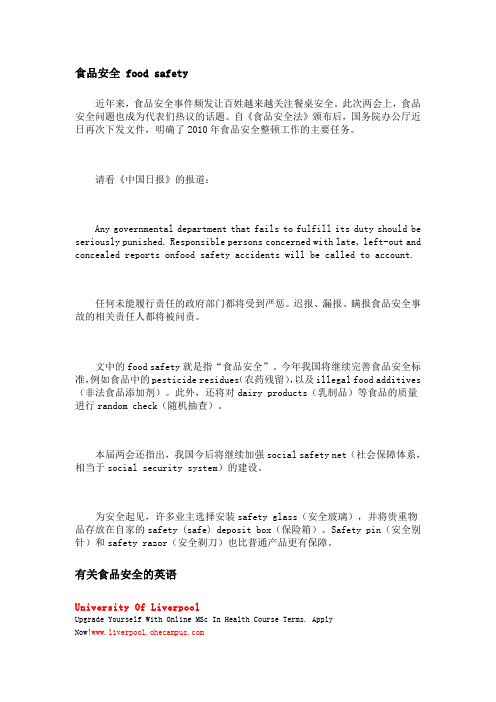
食品安全 food safety近年来,食品安全事件频发让百姓越来越关注餐桌安全。
此次两会上,食品安全问题也成为代表们热议的话题。
自《食品安全法》颁布后,国务院办公厅近日再次下发文件,明确了2010年食品安全整顿工作的主要任务。
请看《中国日报》的报道:Any governmental department that fails to fulfill its duty should be seriously punished. Responsible persons concerned with late, left-out and concealed reports onfood safety accidents will be called to account.任何未能履行责任的政府部门都将受到严惩。
迟报、漏报、瞒报食品安全事故的相关责任人都将被问责。
文中的food safety就是指“食品安全”。
今年我国将继续完善食品安全标准,例如食品中的pesticide residues(农药残留),以及illegal food additives (非法食品添加剂)。
此外,还将对dairy products(乳制品)等食品的质量进行random check(随机抽查)。
本届两会还指出,我国今后将继续加强social safety net(社会保障体系,相当于social security system)的建设。
为安全起见,许多业主选择安装safety glass(安全玻璃),并将贵重物品存放在自家的safety (safe) deposit box(保险箱)。
Safety pin(安全别针)和safety razor(安全剃刀)也比普通产品更有保障。
有关食品安全的英语University Of LiverpoolUpgrade Yourself With Online MSc In Health Course Terms. ApplyNow!最近,染色馒头又引起了轩然大波,那么关于食品安全的英文表达有哪些呢?让我们一起来学习一下吧。
吃的安全的英语

"吃的安全" 可以翻译为"safe to eat",或者"food safety",以下是一些与吃的安全相关的英语表达和句子:1. This food is safe to eat.2. Always check the expiration date to ensure the food is still safe.3. Make sure to wash your hands before handling food for safety.4. The restaurant follows strict food safety regulations.5. It's crucial to store perishable foods in the refrigerator to keep them safe.6. The packaging is designed to maintain the safety and freshness of the food.7. Food safety is a top priority in the production process.8. Proper cooking temperatures are essential for ensuring food safety.9. The Food and Drug Administration (FDA) sets standards to ensure the safety of food products.10. Be aware of food recalls to stay informed about the safety of the products you consume.11. The company conducts regular safety inspections to guarantee the quality of its food products.12. Adhering to hygiene practices is fundamental for maintaining food safety.13. Always buy food from reputable and certified suppliers for added safety.14. The school cafeteria follows strict guidelines to ensure the safety of the meals served to students.15. Farmers markets often provide fresh and safe produce directly from local growers.16. Food safety training is mandatory for all kitchen staff in this establishment.17. This food product has undergone rigorous testing to ensure its safety.18. Consumers play a crucial role in reporting any concerns about food safety.19. Following proper food handling procedures is essential for preventing contamination and ensuring safety.20. The food industry is continuously improving practices to enhance overall food safety.这些表达可以用于描述食品的安全性,包括从购买到存储、烹饪和消费等方面的安全措施。
有关食物安全的英语作文
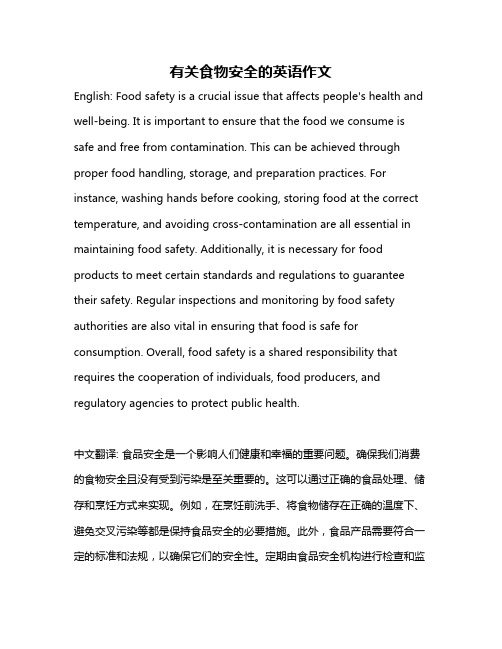
有关食物安全的英语作文English: Food safety is a crucial issue that affects people's health and well-being. It is important to ensure that the food we consume is safe and free from contamination. This can be achieved through proper food handling, storage, and preparation practices. For instance, washing hands before cooking, storing food at the correct temperature, and avoiding cross-contamination are all essential in maintaining food safety. Additionally, it is necessary for food products to meet certain standards and regulations to guarantee their safety. Regular inspections and monitoring by food safety authorities are also vital in ensuring that food is safe for consumption. Overall, food safety is a shared responsibility that requires the cooperation of individuals, food producers, and regulatory agencies to protect public health.中文翻译: 食品安全是一个影响人们健康和幸福的重要问题。
中考英语作文食品安全

中考英语作文食品安全Food Safety。
Nowadays, food safety has become a major concern for people all over the world. With the development of technology and transportation, people can enjoy various kinds of food from different places. However, the safety of these foods is not always guaranteed.There are several reasons for food safety issues. Firstly, some food producers may use harmful chemicals or additives to preserve or enhance the appearance of their products. Secondly, some food may be contaminated duringthe production or transportation process. Thirdly, somefood may be expired or spoiled, but still sold to consumers.To ensure food safety, we need to take some measures. Firstly, the government should strengthen food safety regulations and punish those who violate the law. Secondly, consumers should be more cautious when buying food andchoose products with reliable quality and safety certifications. Thirdly, food producers should prioritize food safety over profit and take responsibility for the quality of their products.In addition, we can also make some changes in our daily life to promote food safety. For example, we can reduce food waste by planning our meals and storing food properly. We can also choose to buy local and seasonal food, which is usually fresher and safer than imported food.In conclusion, food safety is a crucial issue that affects everyone's health and well-being. By working together, we can ensure that the food we eat is safe and healthy.。
食品安全 英语作文

食品安全英语作文Food Safety。
Food safety is a major concern all around the world. It is important to ensure that the food we consume is safe for our health. Food safety refers to the measures taken to ensure that food is free from harmful substances and pathogens that can cause illness or disease.Food safety starts from the farm where the food is grown. Farmers must use safe and sustainable farming practices to ensure that the crops are not contaminated with harmful substances. They must also use safe and effective pesticides and fertilizers to prevent the growth of harmful bacteria and other pathogens.After the crops are harvested, they are transported to processing plants where they are cleaned, sorted, and packaged. It is important that processing plants follow strict hygiene and safety protocols to preventcontamination of the food. They must also use safe and effective methods to preserve the food and prevent spoilage.Once the food is packaged, it is transported to grocery stores and other retailers. During transportation, the food must be kept at the right temperature to prevent spoilage and the growth of harmful bacteria. Retailers must also follow strict hygiene and safety protocols to ensure thatthe food is safe for consumers to purchase and consume.Consumers also play an important role in ensuring food safety. They must be careful when handling and preparing food to prevent contamination. They must also follow the instructions on food packaging to ensure that the food is cooked and stored properly.In addition to these measures, governments around the world have implemented regulations and standards to ensure food safety. These regulations include requirements forfood labeling, food additives, and food packaging. Theyalso include inspections of food processing plants and retailers to ensure that they are following safetyprotocols.Despite all these measures, food safety incidents still occur. These incidents can be caused by a variety of factors, including contamination during processing, improper handling by consumers, and natural disasters. When food safety incidents occur, it is important for governments and other organizations to take swift action to prevent further harm to consumers.In conclusion, food safety is a critical issue that affects everyone. It is important for farmers, processing plants, retailers, and consumers to all take responsibility for ensuring that the food we consume is safe for our health. By working together and following strict safety protocols, we can prevent foodborne illness and ensure a safe and healthy food supply for all.。
人教版模块三unit2写作公开课Food safety

Share my opinion
Reason 1: 金钱驱使着不法商家 (illegal businessman) 无视人们利益制造劣质产品。 Money drives illegal businessman to make low-quality products without paying attention to people’s benefit. Reason 2: 政府部门失职。
Writing
民以食为天,然而食品安全恶性事件频频出现, 我们 不禁要问,我们还能吃什么?食品安全(food safety)成为老百姓关心的一个热点问题。请你以 普通百姓的身份,给某报社写一稿件,说明这一现 象,并提出你的建议。 稿件须包括下列内容: 1) 食品安全问题屡见报道; 2) 分析上述问题产生的原因; 3) 提出应对的措施。
The government doesn’t do its duty.
Reason 3: 人们被广告忽悠了。
People are cheated by some advertisements.
3. How can we solve the problem?
Key words: attach great importance to couldn’t have …getting away with… low-quality effective measures/strict laws puniቤተ መጻሕፍቲ ባይዱh play an important role in supervise(监管)
2. Why? (why do we have the problem?)
Key words: illegal businessmen make profit(获利) without paying attention to government do one’s duty consumer (消费者)
食品安全的英文
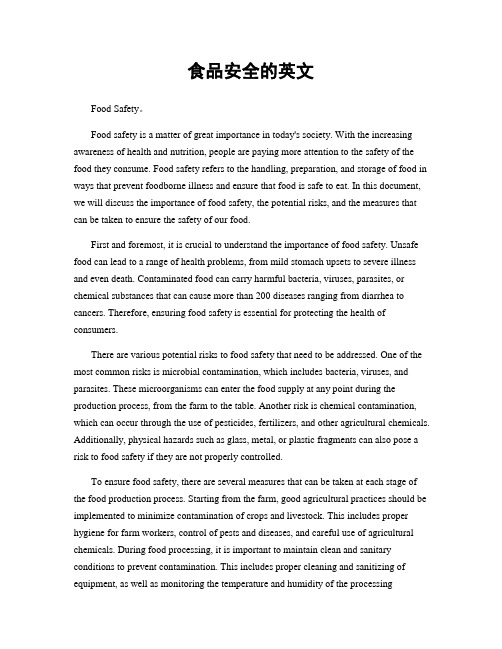
食品安全的英文Food Safety。
Food safety is a matter of great importance in today's society. With the increasing awareness of health and nutrition, people are paying more attention to the safety of the food they consume. Food safety refers to the handling, preparation, and storage of food in ways that prevent foodborne illness and ensure that food is safe to eat. In this document, we will discuss the importance of food safety, the potential risks, and the measures that can be taken to ensure the safety of our food.First and foremost, it is crucial to understand the importance of food safety. Unsafe food can lead to a range of health problems, from mild stomach upsets to severe illness and even death. Contaminated food can carry harmful bacteria, viruses, parasites, or chemical substances that can cause more than 200 diseases ranging from diarrhea to cancers. Therefore, ensuring food safety is essential for protecting the health of consumers.There are various potential risks to food safety that need to be addressed. One of the most common risks is microbial contamination, which includes bacteria, viruses, and parasites. These microorganisms can enter the food supply at any point during the production process, from the farm to the table. Another risk is chemical contamination, which can occur through the use of pesticides, fertilizers, and other agricultural chemicals. Additionally, physical hazards such as glass, metal, or plastic fragments can also pose a risk to food safety if they are not properly controlled.To ensure food safety, there are several measures that can be taken at each stage of the food production process. Starting from the farm, good agricultural practices should be implemented to minimize contamination of crops and livestock. This includes proper hygiene for farm workers, control of pests and diseases, and careful use of agricultural chemicals. During food processing, it is important to maintain clean and sanitary conditions to prevent contamination. This includes proper cleaning and sanitizing of equipment, as well as monitoring the temperature and humidity of the processingenvironment. In food retail and food service establishments, it is crucial to ensure that food is stored, handled, and prepared safely to prevent contamination.In addition to these measures, consumers also play a vital role in ensuring food safety. It is important for consumers to be aware of safe food handling practices, such as washing hands before and after handling food, separating raw and cooked foods, and cooking foods to the appropriate temperature. Furthermore, consumers should be cautious when purchasing food, ensuring that it is from reputable sources and checking for signs of spoilage.In conclusion, food safety is a critical aspect of public health and should be a top priority for everyone involved in the food supply chain, from producers to consumers. By understanding the potential risks to food safety and implementing appropriate measures, we can ensure that the food we consume is safe and free from contamination. It is only through collective efforts and vigilance that we can safeguard the health and well-being of the population. Let us all work together to promote and maintain food safety in our communities.。
食品安全的英语
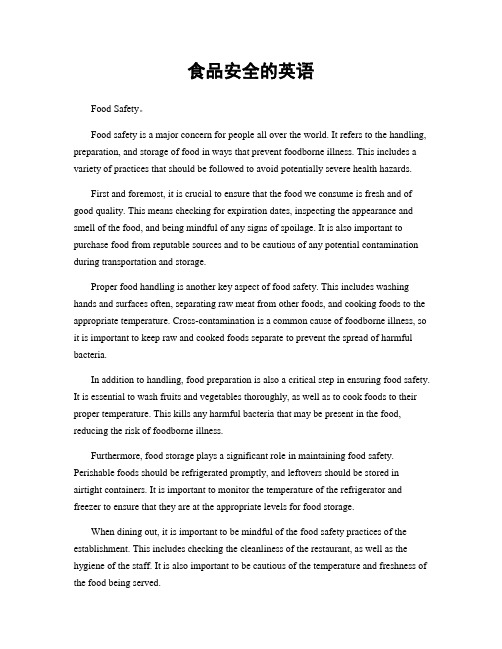
食品安全的英语Food Safety。
Food safety is a major concern for people all over the world. It refers to the handling, preparation, and storage of food in ways that prevent foodborne illness. This includes a variety of practices that should be followed to avoid potentially severe health hazards.First and foremost, it is crucial to ensure that the food we consume is fresh and of good quality. This means checking for expiration dates, inspecting the appearance and smell of the food, and being mindful of any signs of spoilage. It is also important to purchase food from reputable sources and to be cautious of any potential contamination during transportation and storage.Proper food handling is another key aspect of food safety. This includes washing hands and surfaces often, separating raw meat from other foods, and cooking foods to the appropriate temperature. Cross-contamination is a common cause of foodborne illness, so it is important to keep raw and cooked foods separate to prevent the spread of harmful bacteria.In addition to handling, food preparation is also a critical step in ensuring food safety. It is essential to wash fruits and vegetables thoroughly, as well as to cook foods to their proper temperature. This kills any harmful bacteria that may be present in the food, reducing the risk of foodborne illness.Furthermore, food storage plays a significant role in maintaining food safety. Perishable foods should be refrigerated promptly, and leftovers should be stored in airtight containers. It is important to monitor the temperature of the refrigerator and freezer to ensure that they are at the appropriate levels for food storage.When dining out, it is important to be mindful of the food safety practices of the establishment. This includes checking the cleanliness of the restaurant, as well as the hygiene of the staff. It is also important to be cautious of the temperature and freshness of the food being served.In conclusion, food safety is a crucial aspect of our daily lives. By following proper food handling, preparation, and storage practices, we can significantly reduce the risk of foodborne illness. It is important to be vigilant and mindful of the food we consume, as well as the practices of those who handle and prepare our food. Ultimately, food safety is a shared responsibility that requires the cooperation of individuals, food establishments, and regulatory agencies to ensure the health and well-being of consumers.。
食品安全 小知识
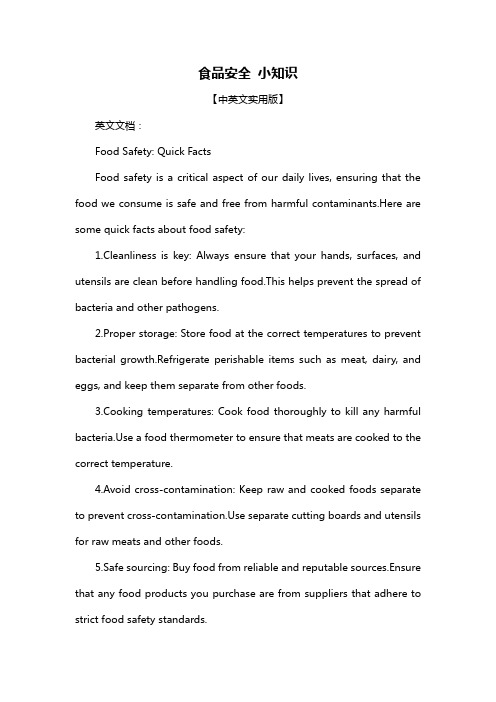
食品安全小知识【中英文实用版】英文文档:Food Safety: Quick FactsFood safety is a critical aspect of our daily lives, ensuring that the food we consume is safe and free from harmful contaminants.Here are some quick facts about food safety:1.Cleanliness is key: Always ensure that your hands, surfaces, and utensils are clean before handling food.This helps prevent the spread of bacteria and other pathogens.2.Proper storage: Store food at the correct temperatures to prevent bacterial growth.Refrigerate perishable items such as meat, dairy, and eggs, and keep them separate from other foods.3.Cooking temperatures: Cook food thoroughly to kill any harmful e a food thermometer to ensure that meats are cooked to the correct temperature.4.Avoid cross-contamination: Keep raw and cooked foods separate to prevent e separate cutting boards and utensils for raw meats and other foods.5.Safe sourcing: Buy food from reliable and reputable sources.Ensure that any food products you purchase are from suppliers that adhere to strict food safety standards.6.expiration dates: Always check the expiration dates of food products and avoid consuming them after they have expired.7.Food handling: Be mindful of how you handle food, especially when preparing meals for others.Practice good hygiene and follow proper food handling techniques.cation and awareness: Stay informed about the latest food safety practices and guidelines.Attend workshops or seminars on food safety to enhance your knowledge.By following these quick facts on food safety, you can help ensure that the food you consume is safe and healthy.中文文档:食品安全:小知识食品安全是我们日常生活中至关重要的一环,确保我们食用的食物安全无害。
英语食品安全作文
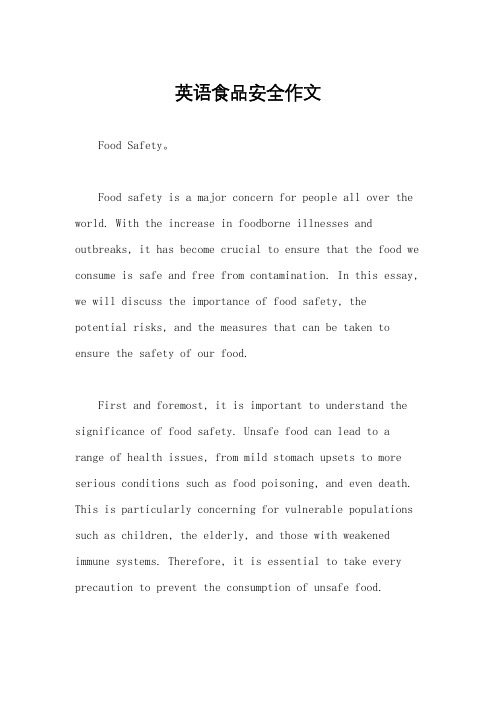
英语食品安全作文Food Safety。
Food safety is a major concern for people all over the world. With the increase in foodborne illnesses and outbreaks, it has become crucial to ensure that the food we consume is safe and free from contamination. In this essay, we will discuss the importance of food safety, thepotential risks, and the measures that can be taken to ensure the safety of our food.First and foremost, it is important to understand the significance of food safety. Unsafe food can lead to a range of health issues, from mild stomach upsets to more serious conditions such as food poisoning, and even death. This is particularly concerning for vulnerable populations such as children, the elderly, and those with weakened immune systems. Therefore, it is essential to take every precaution to prevent the consumption of unsafe food.There are several potential risks to food safety, including biological, chemical, and physical hazards. Biological hazards include bacteria, viruses, and parasites that can contaminate food and cause illness. Chemical hazards can arise from the use of pesticides, additives, and other substances in food production. Physical hazards, on the other hand, include foreign objects such as glass or metal that may inadvertently end up in food products. It is important for food producers and handlers to be aware of these risks and take steps to mitigate them.To ensure food safety, there are several measures that can be taken at every stage of the food supply chain. Starting from the farm, it is important to implement good agricultural practices to minimize the risk of contamination. This includes proper handling of animal waste, use of safe irrigation water, and appropriate use of pesticides and fertilizers. In food processing facilities, it is crucial to maintain strict hygiene and sanitation standards to prevent the spread of bacteria and other pathogens. This includes regular cleaning and disinfection of equipment, proper storage of raw materials, andeffective pest control measures.Furthermore, proper labeling and packaging of food products are important to ensure that consumers are aware of any potential allergens or contaminants in the food they are purchasing. This allows individuals to make informed decisions about the food they consume and can help prevent adverse reactions to certain ingredients. Additionally, proper storage and handling of food products in retail establishments and at home are essential to prevent spoilage and contamination.In recent years, technological advancements have also played a role in improving food safety. For example, the use of blockchain technology has allowed for greater traceability of food products, making it easier to identify the source of any contamination and prevent it from spreading further. Similarly, the use of sensors and other monitoring devices can help detect any potential issues in food production and distribution, allowing for quicker intervention and prevention of foodborne illnesses.In conclusion, food safety is a critical issue that affects everyone. It is important for all stakeholders in the food supply chain, from producers to consumers, to take responsibility for ensuring the safety of our food. By implementing good practices, following strict standards, and leveraging technology, we can minimize the risks of foodborne illnesses and enjoy safe and nutritious food. Remember, food safety is everyone's responsibility.。
- 1、下载文档前请自行甄别文档内容的完整性,平台不提供额外的编辑、内容补充、找答案等附加服务。
- 2、"仅部分预览"的文档,不可在线预览部分如存在完整性等问题,可反馈申请退款(可完整预览的文档不适用该条件!)。
- 3、如文档侵犯您的权益,请联系客服反馈,我们会尽快为您处理(人工客服工作时间:9:00-18:30)。
Food safety
Listen to this story
I'm Gwen Outen with the VOA Special English Agriculture Report.
Our subject this week involves food safety. We have a question from a listener in Ho Qi Minh City, Vietnam. Nguyen Thanh Thanh asked how can food companies control problems like rats and insects without harming the food. Experts say poisons should never be used where they may enter food. They say the first line of defense against pests is to clean places where food is handled or stored.
Floors, food preparation surfaces and tools can be disinfected with chemicals like chlorine, iodine or bromine. A five-and-one-quarter percent chlorine solution is commonly used. Mix 19 milliliters of chlorine solution with five liters of water for use in cleaning.
Food containers should be stored about one half a meter off the ground. They should also be kept about one half a meter away from walls. Storage areas should be kept dry and clean. Good drainage means that floors do not have the areas where water can collect.
Wheat's containers inside and outside the building should be kept closed. And they should be kept clean. Clear away any wheat from the grounds around the building. Small stones can be used to cover the ground and block the growth of plants. Keep areas of grass cut to deny pests a place to live.
Doors and window must close completely. Also any hole that might permit pests to enter a building should be filled. Rats can enter through a hole 13 millimeters in size. A mouse can pass through a hole half that size.
Supervisors should make a list of pest control measures to be taken by employees. This will aid the efforts and also help prepare for any inspections. In the United States, businesses where food is stored, prepared or sold must follow federal, state and local health laws.
The Food and Drug Administration enforces federal rules. So does the food's safety and inspection service, part of the Department of Agriculture. The Environmental Protection Agency is responsible for rules about the use of pesticides. The United States government has a Web site with information all about food's safety. The address is .
If you have a question for us about agriculture or related-subjects, write to special@, or visit us online at .
This VOA Special English Agriculture Report was written by Mario Ritter. I'm Gwen Outen.
V ocabulary:
disinfect: to cleanse so as to destroy or prevent the growth of disease-carrying microorganisms(消毒,杀菌)solution: a homogeneous mixture of two or more substances, which may be solids, liquids, gases, or a combination of these(溶液,两种以上物质的同质混合物)
milliliter: 千分之一公升,毫升。
